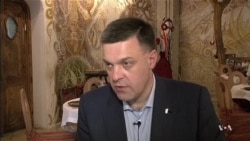KYIV —
Ukraine’s Svoboda party, which means freedom in Ukrainian, espouses an ultra-nationalist, anti-Russian agenda, and its critics say Svoboda is an anti-Semitic, neo-Nazi organization. Oleh Tyahnybok, the Svoboda party candidate for president is not the front-runner in the race, but, during the current tense stand-off with pro-Russian separatists in eastern Ukraine, many of his views reflect, now more than ever, the mainstream nationalist sentiment.
Svoboda party candidate Oleh Tyahnybok supports building a strong military to resist any Russian incursions and to fight pro-Russian separatists. While he endorses increased autonomy for regional governments, Tyahnybok says there can be no negotiations with what he calls the terrorists who advocate secession for eastern Ukraine.
“Today the government has to finish as soon as possible the anti-terrorist operation to isolate the terrorists, to disarm them, to initiate criminal investigations against the people who are causing this trouble," said Tyahnybok.
The Svoboda party was a force in the protests that ousted President Viktor Yanukovych earlier this year. In recent years it has won 10 percent of the seats in Ukraine's parliament.
But the party stirs controversy with its pro-ethnic Ukrainian stances, conservative Christian views and past anti-Semitic statements. In a 2004 speech before parliament, Tyahnybok said that Ukraine was controlled by a “Muscovite-Jewish mafia.”
University of Kyiv-Mohyla Academy politics professor Olexiy Haran says Tyahnybok and his party have moderated their views in recent years.
“They started from far right. He made some anti-Semitic and xenophobic statements, but, after 2004, I am watching very carefully because I criticized him for that. His rhetoric is, you know, is not xenophobic," said Haran.
Tyahnybok says he supports the interim government's ruling to make Ukrainian the only national language, an issue that helped fuel discontent in Russian-speaking parts of the country.
“My position and the position of the Svoboda party is the following: the only national language is Ukrainian, and that’s not even under discussion, and we will not give in to any concession on that. But in everyday life people can use any language they like," he said.
And, like many Ukrainians, he regrets that the country gave up its nuclear arsenal in exchange for promises from Russia, the United States and Great Britain to respect Ukraine’s independence, sovereignty and borders.
“In every meeting people stand up and say that was a mistake, that we got rid of our nuclear status because the U.S. is not fulfilling its agreement with Ukraine. If we had the nuclear button then Putin would never start a war," said Tyahnybok.
While Svoboda party candidate Oleh Tyahnybok may be seen as extreme on issues of race and religion, on national security issues his views are in sync with those of mainstream pro-Ukrainian nationalists.
Svoboda party candidate Oleh Tyahnybok supports building a strong military to resist any Russian incursions and to fight pro-Russian separatists. While he endorses increased autonomy for regional governments, Tyahnybok says there can be no negotiations with what he calls the terrorists who advocate secession for eastern Ukraine.
“Today the government has to finish as soon as possible the anti-terrorist operation to isolate the terrorists, to disarm them, to initiate criminal investigations against the people who are causing this trouble," said Tyahnybok.
The Svoboda party was a force in the protests that ousted President Viktor Yanukovych earlier this year. In recent years it has won 10 percent of the seats in Ukraine's parliament.
But the party stirs controversy with its pro-ethnic Ukrainian stances, conservative Christian views and past anti-Semitic statements. In a 2004 speech before parliament, Tyahnybok said that Ukraine was controlled by a “Muscovite-Jewish mafia.”
University of Kyiv-Mohyla Academy politics professor Olexiy Haran says Tyahnybok and his party have moderated their views in recent years.
“They started from far right. He made some anti-Semitic and xenophobic statements, but, after 2004, I am watching very carefully because I criticized him for that. His rhetoric is, you know, is not xenophobic," said Haran.
Tyahnybok says he supports the interim government's ruling to make Ukrainian the only national language, an issue that helped fuel discontent in Russian-speaking parts of the country.
“My position and the position of the Svoboda party is the following: the only national language is Ukrainian, and that’s not even under discussion, and we will not give in to any concession on that. But in everyday life people can use any language they like," he said.
And, like many Ukrainians, he regrets that the country gave up its nuclear arsenal in exchange for promises from Russia, the United States and Great Britain to respect Ukraine’s independence, sovereignty and borders.
“In every meeting people stand up and say that was a mistake, that we got rid of our nuclear status because the U.S. is not fulfilling its agreement with Ukraine. If we had the nuclear button then Putin would never start a war," said Tyahnybok.
While Svoboda party candidate Oleh Tyahnybok may be seen as extreme on issues of race and religion, on national security issues his views are in sync with those of mainstream pro-Ukrainian nationalists.






